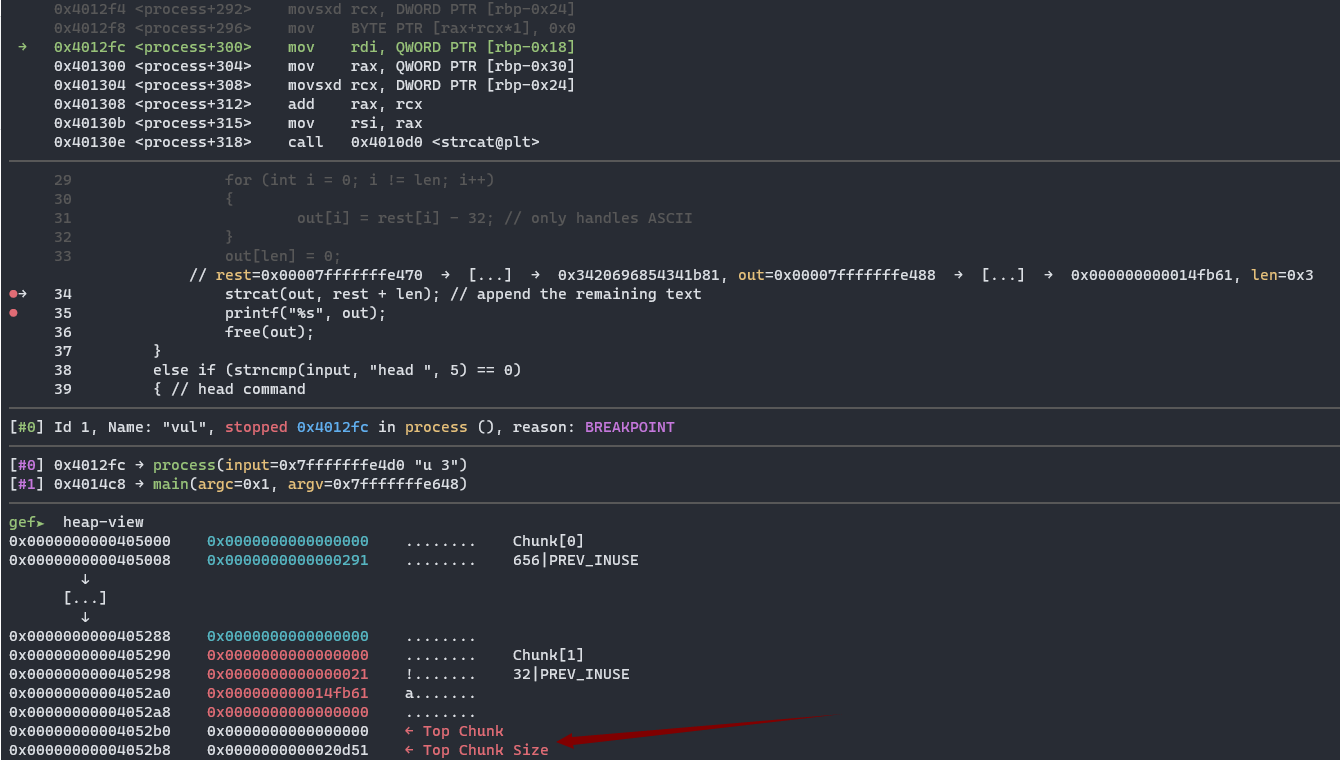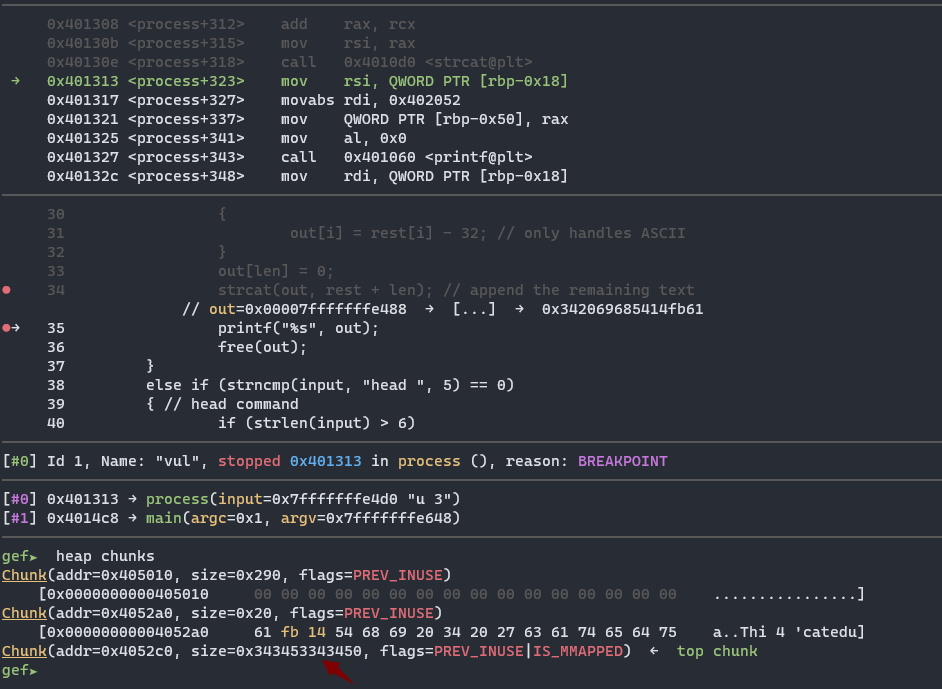AFL++学习日志(一)开始Fuzz与crashes分析
前言
American Fuzzy Lop plus plus (afl++)是一个由社区驱动的开源工具,它结合了最新的模糊研究,使研究具有可比性,可重复性,可组合性,并且-最重要的是-可用的 。它提供了多种新功能,例如,Custom Mutator API (传统的突变API)能够增加模糊测试处理策略,特定目标的变异也可以由经验丰富的安全测试人员编写。具体细节可以参阅AFL++ : Combining Incremental Steps of Fuzzing Research。
本文主要介绍如何使用AFL++快速开始Fuzz一个样例程序和对大量的Fuzzer-Generated Crashes进行分类以及部分工具的安装与使用,如有错漏,也请师傅们不吝赐教。
AFL++的安装
American Fuzzy Lop plus plus (afl++)
Release Version: 3.14c
Github Version: 3.15a
Repository: https://github.com/AFLplusplus/AFLplusplus
Doc: https://aflplus.plus/
最简单的当然就是使用Docker啦,直接一键pull就可以使用了,具体请参见Dockerfile(一般情况下都够用了)
1 | |
或者手动安装依赖后下载源码编译构建。(建议下载最新版本的编译器)
1 | |
有时你可能需要切换下软件的默认版本。
1 | |
获取源码并编译安装。
1 | |
make构建目标选择:
- all: just the main AFL++ binaries
- binary-only: everything for binary-only fuzzing: qemu_mode, unicorn_mode, libdislocator, libtokencap
- source-only: everything for source code fuzzing: instrumentation, libdislocator, libtokencap
- distrib: everything (for both binary-only and source code fuzzing)
- man: creates simple man pages from the help option of the programs
- install: installs everything you have compiled with the build options above
- clean: cleans everything compiled, not downloads (unless not on a checkout)
- deepclean: cleans everything including downloads
- code-format: format the code, do this before you commit and send a PR please!
- tests: runs test cases to ensure that all features are still working as they should
- unit: perform unit tests (based on cmocka)
- help: shows these build options
构建选项:
- STATIC - compile AFL++ static
- ASAN_BUILD - compiles with memory sanitizer for debug purposes
- DEBUG - no optimization, -ggdb3, all warnings and -Werror
- PROFILING - compile with profiling information (gprof)
- INTROSPECTION - compile afl-fuzz with mutation introspection
- NO_PYTHON - disable python support
- NO_SPLICING - disables splicing mutation in afl-fuzz, not recommended for normal fuzzing
- AFL_NO_X86 - if compiling on non-intel/amd platforms
- LLVM_CONFIG - if your distro doesn’t use the standard name for llvm-config (e.g. Debian)
安装完成后的系统配置:
1 | |
开始Fuzzing
相信很多人在刚开始的时候都会有下面两个问题(包括我)
- 不熟悉模糊测试工具;
- 用模糊测试测试什么内容
对于第一点,建议参阅FuzzingBook和Sakura师傅的AFL源码注释,至于第二个,我建议的选择是类似于afl-training或者EkoParty_Advanced_Fuzzing_Workshop等学习类型的target,也是本系列文章的主要内容部分(后续实战目标的选择可以看我的博客)。
Fuzzing with AFL workshop
Repository: https://github.com/mykter/afl-training
Doc: https://github.com/mykter/afl-training/files/5454345/Fuzzing.with.AFL.-.GrayHat.2020.pdf
Docker: https://ghcr.io/mykter/fuzz-training
测试代码可以在此下载,核心函数代码如下:
1 | |
使用afl-clang-fast进行编译,如提示命令未找到就将AFL++目录添加至PATH环境变量。
1 | |
优先选择更好的插桩方式,若使用afl-cc会自动选择最合适的编译器。
1 | |
设置AFL_HARDEN会让调用的下游编译器自动化代码加固,使得检测简单的内存bug变得更加容易,但会减少5%左右的性能,关于AFL++的环境变量设置可以参阅https://aflplus.plus/docs/env_variables/。
使用afl-fuzz进行Fuzz,输入可以随意写,如echo 1 > inputs/1,或带有源码中关键字的输入(推荐),如echo "u 4 capsme" > inputs/2,但需保证输入必须能使程序正常运行(即不能一开始就整个crash)。
1 | |
如果一切正常的话,睡个午觉之后你就能看见类似于如下的图:

每个独特的crash和命令参数都将存放在输出文件夹的crashes文件夹下,接下来就是对这些crash进行调试分析了。
crashes分类与自动化分析
在开始分析前请确保已安装gdb等常用二进制调试工具,我使用的是GDB的gef插件。
对crashes的分类包括调试分析Fuzz程序发现的每个crash以确定碰撞是否值得进一步分析(对安全研究人员而言,这通常意味着确定crash是否可能是由漏洞造成的),如果是,则确定crash的根本原因。详细地人工分析每一个crash都非常耗时耗力,尤其当Fuzzer已经识别出几十次或上百次crash时。
幸运的是现在已有许多可用于帮助分类或分析crash的技术和工具。虽然crashes的分类仍然可能是一个痛苦的过程,但下述的工具可以帮助减轻一些乏味的工作,至少也能大概确定最有可能触发安全相关问题的crash优先级。
crash复现与初步分析
首先我们来看看刚才得到的九个crash(这里只有八个的原因是我服务器崩了导致我重跑了一遍,但第九个crash怎么也出不来。。。。。。。。)

我们先用gdb简单调试下:


显然,我们能知道错误类型(在这种情况下为SIGSEV),发生错误的代码行(因为二进制文件是带调试信息编译的),造成崩溃的指令(movdqu xmm2, XMMWORD PTR [r13+rdi*1+0x11],大概率是因为非法访问内存),backtrace以及其他诸如stack内容等信息。但逐个这样分析crash是一件很费时费力的工作,所以我们需要一些自动化工具来帮助我们进行分析。
自动化工具的介绍和使用
GDB ‘exploitable’ plugin
Repository: https://github.com/jfoote/exploitable
exploitable是一个gdb插件,安装请参见安装文档,它试图确定某个特定的crash是否可能可以被利用。该插件为各类程序状态提供了一系列的分类标准,如果程序处于可以被插件识别的状态,它将为该状态分配可利用性的分类。使用如下:

此工具可以帮助用户优先分析那些最有可能被利用的crash,不太可能被利用的(或者插件无法分析的)可能仍然值得分析,但这是在调试了那些更有希望发现漏洞的crash之后。
crashwalk
Repository: https://github.com/bnagy/crashwalk
Doc: https://pkg.go.dev/github.com/bnagy/crashwalk
Crashwalk是在exploitable插件基础上开发的一款工具。Crashwalk将遍历AFL生成的crashes并在crash状态下运行exploitable并生成一个crashwalk.db文件。
使用方法:
1 | |

使用cwdump获取摘要:
1 | |

afl-utils
Repository: https://gitlab.com/rc0r/afl-utils
Docs: https://gitlab.com/rc0r/afl-utils/-/tree/master/docs
含有一系列协助Fuzzing的工具集合:
- 自动crash样本收集,验证,过滤和分析(
afl-collect,afl-vcrash) - 轻松管理并行(多核)Fuzz测试作业(
afl-multicore,afl-multikill) - 语料库优化(
afl-minimize) - Fuzz状态统计监督(
afl-stats) - Fuzzer队列同步(
afl-sync) - 自主实用程序执行(
afl-cron)
其中afl-collect与crashwalk类似,也可调用exploitable进行简单分析并生成库,具体上篇文章已经介绍过了,不再赘述,直接上图:


可以看出afl-collect很快就统计了脚本数据并将crashes整合后复制到了输出文件夹,对比crashwalk的结果而言简明了很多。但需要注意的是,exploitable并没有考虑在现有防御机制下漏洞的利用难度,所以我们还需要使用下述工具来辅助我们进行分析。
AFL crash exploration mode
Repository: https://github.com/AFLplusplus/AFLplusplus#help-crash-triage
Reference: https://lcamtuf.blogspot.com/2014/11/afl-fuzz-crash-exploration-mode.html
这是一种内置于AFL中的模式,Fuzzer将一个或多个导致crash的测试用例作为输入,并使用其feedback-driven fuzzing策略在保持crash的情况下快速枚举程序中可以到达的所有代码路径。
一般而言,我们希望Fuzzer找到更多独特的crash而不是一次又一次的同类crashes。然而,正如文档中所指出的,这种模式的目的是创建一个小的crashes库从而可以快速地检查它来分析我们对漏洞的控制程度。例如,如果crash与写入地址有关,但我们无法控制该地址,那么这个就可能不是那么有用。另一方面,如果AFL的crash exploration模式确定我们可以通过更改输入来对任意地址执行写操作,那么我们就更有可能利用这个漏洞进行攻击。
我们将使用afl-fuzz生成的初始崩溃用例来启用崩溃探索模式,即将crashes目录作为输入并使用-C运行afl-fuzz:
1 | |
当AFL开始以这种模式运行时,它将检查测试用例以确保它们导致crash,如下所示:

在AFL的正常模式中,此步骤的目的是对测试用例进行检查以确保它们不会导致崩溃。AFL希望使用正常的测试文件来使程序按预期方式运行,以便可以对它们进行迭代以触发异常行为。相反,崩溃探索模式确保这些测试用例已经导致crash,因为它将尝试识别将导致相同状态的其他代码路径。

Record and Replay Framework
Repository: https://github.com/rr-debugger/rr
Doc: https://rr-project.org/
Wiki: https://github.com/rr-debugger/rr/wiki
Reference: Engineering Record And Replay For Deployability Extended Technical Report
需要Linux内核3.11或更高版本且/proc/sys/kernel/perf_event_paranoid必须小于等于1(即能够使用perf计数器)。详细要求请参阅https://github.com/rr-debugger/rr/wiki/Building-And-Installing#hardwaresoftware-configuration 。我的服务器不符合要求,就在这里仅做个介绍推荐吧,有空再补(咕了
对crash的简单调试
让我们从上面分完类的crashes中随机挑一个丢到gdb里去,在strcat(out, rest + len);处下个断点(当然在其他地方也可以,主要是这里的溢出点太明显了。。。。)

可以看出来在执行strcat函数之前的堆还是十分正常的

oops,溢出啦,让我们来看一下输入文件的内容

显然是因为strcat造成溢出覆盖了top chunk,然后在printf调用malloc的时候触发crash。而输入我们是可以自定义的,也就是说我们现在可以控制top chunk的size了,接下来的利用过程就交给各位师傅们了。

总结
在本文中我们介绍了AFL++的安装和各类工具的使用以帮助我们对Fuzzer生成的crashes进行分类与分析。当然,还有很多自动化分析工具没有介绍,具体可以参阅https://aflplus.plus/docs/sister_projects/#crash-triage-coverage-analysis-and-other-companion-tools。
在下篇文章中我会学着如何对一些简单的库代码和真实软件编写harness来帮助Fuzzer更好地进行Fuzzing。